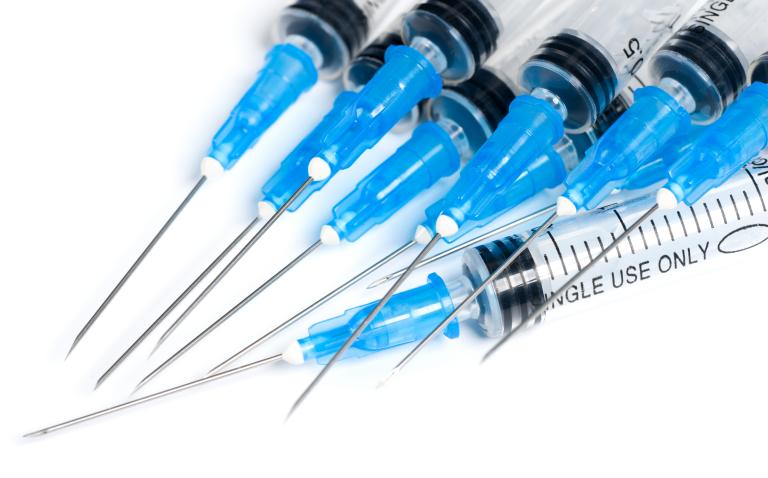A study presented at EULAR 2019, jointly organised with the Paediatric Rheumatology Society (PReS), demonstrate no vaccine infections, and no disease flare, in the 234 rheumatic patients who received live-attenuated booster vaccination while taking immune suppressing therapies.1
There are estimated to be over 75,000 children living with rheumatic diseases in Europe.2 Safe and effective vaccination is crucial given their increased risk of infections, however, in patients who are on high doses of therapies that suppress the immune system, it is currently recommended to withhold live-attenuated vaccines (although this can be considered on a case-to-case basis). This is due to a theoretical, but not proven, risk of developing the infection.3
Live-attenuated vaccines contain viruses or bacteria that have been weakened, but not destroyed, in a laboratory.They cannot cause disease in healthy people but can still produce a strong immune response.4 Some doctors already vaccinate their patients with rheumatic disease on immune suppressing therapies with the live-attenuated MMR (measles, mumps, rubella) or MMRV (MMR, varicella) booster. This is because, in light of recent measles epidemics in Europe and in the US, they feel the theoretical risk of vaccination is much lower than the risk of disease.This study identified 234 such patients from 13 centres across 10 countries and found no vaccine infections and low rates of adverse events.1
“Patients with rheumatic and musculoskeletal diseases have an increased risk of infection and so it is vital to vaccinate where possible to save lives,” said Professor Hans Bijlsma, President, EULAR.
“There is a lot of ‘fake news’ surrounding vaccination in the media and online and therefore we welcome these data presented today which should help dispel some of the public worries.”
In the study, the live-attenuated MMR or MMRV booster vaccine was given to 110 cases on methotrexate with three reporting mild injection-site reactions, 76 cases on methotrexate plus anti-tumour necrosis factor (anti-TNF) with seven reporting mild transient AEs; and 39 cases on anti-TNF alone with one reporting fever. Other biologic therapies were used on the remaining patients, three were on tocilizumab, seven on anakinra, and five on canakinumab. The vast majority had juvenile idiopathic arthritis (n=206) with disease activity considered low, moderate and high in 38%, 7% and 2% respectively.1
“The positive results of our study suggest live-attenuated MMR and MMRV booster vaccination is safe in children with rheumatic diseases,” said Prof Yosef Uziel, paediatric department, Meir Medical Center, Sackler School of Medicine, Tel Aviv University, and PreS working party on vaccination, Israel.
“Current recommendations are cautious due to low levels of evidence and so we are launching a prospective study on safety and efficacy of MMR booster vaccine in paediatric rheumatology patients treated with immunosuppressive therapy, including biological therapy.”
The flu vaccine is not live-attenuated and is recommended in all patients affected by rheumatoid arthritis, regardless of treatment. However, there is data showing that patients are not being vaccinated as recommended and hence putting themselves at risk.5
The first real-world study of the flu vaccine in patients with autoimmune rheumatic diseases (AIRDs) was presented at EULAR 2019. The study included 14,928 AIRD cases and found no association between the flu vaccine and disease activity, prescription of corticosteroid, or vasculitis. In fact, results demonstrate the flu vaccine is associated with a significant reduction in fatigue in the 2-3 months post vaccination, and a significant reduction in primary-care consultations for joint pain in the three months post-vaccination period.6
“Our results clearly support the use of the flu vaccine in rheumatic patients and should dispel any fears people have about reported links to disease activity or vasculitis,” said Dr Georgina Nakafero, Academic Rheumatology, University of Nottingham.
Another reason cited for not vaccinating against flu in patients with rheumatic diseases taking immune suppressing therapies is that, because the body has a weakened immune system, the response to the vaccine may not be big enough to protect the patient from a subsequent flu infection.6
A third study, also presented today during EULAR 2019, reveals that, in order to prevent one case of flu, you only need to vaccinate 10 people with rheumatoid arthritis on a tumour necrosis factor inhibitor whereas you need to vaccinate 71 healthy individuals. This is because, although the immunity developed in response to the vaccine may not be as strong in these patients, their increased risk of infection means more cases are prevented.7
“Our analysis provides further evidence on the effectiveness of flu vaccination in patients affected by rheumatoid arthritis receiving treatment with tumour necrosis factor inhibitor sand should represent a call-to-action for all rheumatologists to consider vaccination in such patients,” said Dr Giovanni Adami, University of Verona, Rheumatology Unit.
References
- Uziel Y et al. Live attenuated vaccines in pediatric rheumatic diseases are safe: multi-center, retrospective data collection. EULAR 2019; Madrid: Abstract OP0205.
- Clemente D et al. Transitional care for rheumatic conditions in Europe: current clinical practice and available resources. Pediatr Rheumatol Online J.2017;15:49.
- Heijstek MW et al. EULAR recommendations for vaccination in paediatric patients with rheumatic diseases Ann Rheum Dis. 2011;70:1704-1712.
- NHS. Vaccine ingredients. Available at: https://www.nhs.uk/conditions/vaccinations/vaccine-ingredients/[Last accessed May 2019]
- Loubet P et al. Attitude, knowledge and factors associated with influenza and pneumococcal vaccine uptake in a large cohort of patients with secondary immune deficiency. Vaccine. 2015;33(31):3703-8.
- Nakafero G et al. Inactivated influenza vaccination does not associate with disease flares in autoimmune rheumatic diseases: a self-controlled case series study using data from the clinical practice research datalink. EULAR 2019; Madrid: Abstract OP0260
- Adami G et al. Effectiveness of influenza vaccine in TNF inhibitors treated patients. EULAR 2019; Madrid: Abstract OP0230










